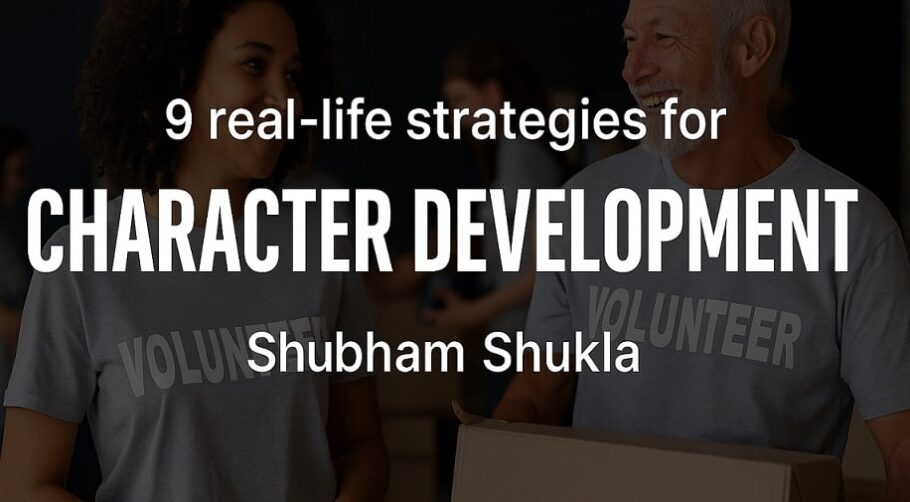Why Character Development Still Matters
Character development isn’t just some abstract idea we talk about in classrooms. It’s the quiet thread running through everything—how we treat others, how we handle pressure, and how we respond when no one’s watching.
Think about the friend who shows up when things fall apart. The stranger who steps in without being asked. The leader who admits their mistakes instead of dodging them. These moments speak louder than any title or resume ever could.
But strong character doesn’t just show up one day. It’s built—day by day, choice by choice. Through every small decision, like keeping a promise or staying kind when it’s easier not to.
That’s the heart of character development: not perfection, but progress. So if you’re ready to grow into the kind of person you’d respect, you’re in the right place. Let’s take it one real, honest method at a time.
Table of Content:
- Why Character Development Still Matters
- 1. Start with Self-Awareness (It’s More Than Just “Knowing Yourself”)
- 2. Surround Yourself with People Who Challenge You
- 3. Practice What You Preach (Even When No One’s Watching)
- 4. Challenge Yourself for True Character Development
- 5. Character Development Through Serving Without Expectation
- 6. Learn From Failure—Failure Fuels Character Development
- 7. Growth and Character Development Start with Discomfort
- 8. Read Stories That Inspire Character Development
- 9. Character Development Through Sticking to Your Values, Even When It’s Inconvenient
- Conclusion: Character Is a Daily Choice
1. Start with Self-Awareness (It’s More Than Just “Knowing Yourself”)
Before you can develop good character, you’ve got to know who you are—and not just the version you show to others.
Self-awareness means paying attention to your patterns, your triggers, your strengths, and your flaws. It’s noticing when you interrupt people. When you cut corners. When your ego flares up after a small win.
And instead of brushing it off, you pause and ask, Why did I do that? That moment right there—that’s where character starts.
A few ways to build self-awareness:
- Keep a journal. Not the “dear diary” kind. Just a few notes a day on what you did well and where you slipped.
- Ask for feedback from people who’ll tell you the truth, not just what you want to hear.
- Sit in silence, even for five minutes. Let your mind settle. See what bubbles up.
The goal isn’t perfection. It’s honesty. And that honesty becomes your foundation for every other kind of growth.
You May also like: Powerful Adjectives to Describe a Person
2. Surround Yourself with People Who Challenge You
If you want to develop good character, don’t only hang around people who agree with everything you say. Growth doesn’t come from comfort. It comes from tension—the good kind. The kind that makes you stop and think, Wait, am I wrong here?
You don’t need cheerleaders. You need truth-tellers for character development. The kind of friends, mentors, or colleagues who’ll call you out when you’re slipping and push you to level up—not tear you down, but hold you to a higher standard.
I still remember something a college professor once told me. I had just turned in a paper I was proud of. It got a decent grade, but at the bottom, he wrote:
“You’re smart enough to write something better. This felt safe.”
At first, I was annoyed. I wanted praise. But the more I thought about it, the more I realized he was right. I’d done the minimum. I hadn’t taken any risks. That note changed how I approached not just writing, but work and conversations too. It made me ask more from myself.
Here’s what to look for in people who help build moral character:
- Theses people give honest feedback, even when it’s uncomfortable
- They live with integrity themselves, so their words carry weight
- And also, encourage your growth, not just your success
If everyone around you is always clapping, you might be in the wrong room. Find the people who love you enough to tell you the truth—and stick close to them. This is what you really need for a good character development.
3. Practice What You Preach (Even When No One’s Watching)
Talk is easy. Anyone can say the right things, especially when other people are listening. But character doesn’t live in your words—it lives in your actions. Especially the ones no one else sees.
Character development strategies often focus on big ideals, but it’s the daily stuff that really shapes who you are. Do you keep your promises, even when it’s inconvenient? Do you show up on time, not just when it matters to your boss, but when you said you would? Do you admit when you mess up, or do you find a way to spin it?
That’s where moral integrity lives—in the small, ordinary decisions that add up to something bigger.
Here’s the quiet truth:
You build character in the moments when no one’s watching, but you show it in the moments when everyone is.
Some habits for character development that help build consistency and integrity:
- Keep a personal “did I live my values today?” check-in before bed
- Set reminders to follow through on things you’ve promised—even tiny ones
- Own your mistakes out loud, without defensiveness or excuses
Consistency isn’t glamorous. It doesn’t get applause. But over time, it builds a reputation people can count on—and more importantly, one you can be proud of when you’re alone with your thoughts. That’s real character.
You may also like: The Impact of Literary Books on Culture and Society
4. Challenge Yourself for True Character Development
It’s easy to coast. To stay comfortable. To avoid the hard stuff because, well… it’s hard. But if you’re serious about developing strong character, comfort can’t be your goal. Growth lives in challenge. Always has.
Doing hard things—on purpose—builds grit. It sharpens your judgment. It teaches you what you’re really made of. That might look like:
- Taking full responsibility when you screw up
- Having an honest conversation you’ve been avoiding
- Saying no to shortcuts that feel easy but compromise your values
For me, the shift happened when I started waking up early—not because I wanted to, but because I needed to take control of my day. That small act of discipline, repeated over time, changed more than just my mornings. It taught me that personal growth through discipline isn’t about grand gestures. It’s about showing up for yourself, even when you don’t feel like it.
The more you train yourself to face discomfort head-on, the more resilient you become. And not just mentally—emotionally, morally, even spiritually.
Character isn’t built in theory. It’s built in action. So pick something that scares you a little. Or stretches you. Then do it. Again and again.
That’s where the real transformation begins.
5. Character Development Through Serving Without Expectation
Character isn’t just about how you treat yourself—it’s how you treat others when there’s nothing in it for you. That’s where altruism kicks in. And no, it doesn’t mean you have to save the world. Just start small.
It could be as simple as checking in on a friend who’s been quiet lately. Helping a new teammate without being asked. Picking up trash at the park because it bothers you more to leave it there.
That kind of service—quiet, uncelebrated, and genuine—is where real character lives.
I remember once seeing a guy at a train station help an elderly woman carry her heavy bag down the stairs. No fuss, no conversation. Just action. He disappeared before she could even thank him. That moment stuck with me, more than most TED talks or books ever have.
If you’re serious about building character through service, try this:
- Volunteer somewhere no one knows your name
- Do a kind act without telling anyone about it
- Ask someone how you can help, and really listen to their answer
The key isn’t the size of the gesture—it’s the intention behind it. When you give without expecting anything in return, something inside you shifts. You stop making life all about you. And that humility? That’s a powerful foundation for strong, steady character.
6. Learn From Failure—Failure Fuels Character Development
We all fail. Miss deadlines. Hurt someone. Take a wrong turn and pretend like we meant to.
But here’s the thing: failure on its own doesn’t build character. Character building through failure only happens if you stop, face it, and ask the hard questions. Not just what went wrong, but what part did I play? and what will I do differently next time?
Most people rush past that. They patch things up and move on. But if you slow down and sit with it—even when it’s uncomfortable—that’s where emotional maturity begins.
A few years ago, I completely mishandled a client project. I underestimated the time it would take, missed a key deadline, and then tried to over-explain instead of just owning the mistake. They weren’t even that angry—but I knew I’d let them down. The turning point wasn’t the apology. It was what I did afterward: I built new systems for managing time, stopped overpromising, and started flagging risks early. That failure rewired the way I work.
Here’s how to make your own failures count:
- Write down what happened, what you learned, and what you’ll change
- Talk to someone you trust about it—don’t carry it alone
- Revisit it later, once emotions settle, to see how far you’ve come
Failure can either harden you or humble you. The difference is in how you respond. The people with real strength? They choose humility. And they use their mistakes to grow—not just professionally, but as better, more grounded humans.
You may also like: What are the main elements of creative writing?
7. Growth and Character Development Start with Discomfort
No one likes being uncomfortable. It’s awkward. It’s vulnerable. It usually comes with sweaty palms and a voice in your head saying, Don’t do this. But if you’re serious about building courage and character, you can’t keep avoiding the hard stuff.
Discomfort is the price of growth. Always has been.
It shows up in all kinds of moments:
- Speaking up in a meeting when your idea might get shot down
- Giving honest feedback to a friend instead of staying polite
- Admitting you were wrong, even when your pride wants to argue
- Confronting your own bias or blind spots instead of looking away
These are all real methods of character development—not the kind you read about, but the kind that shows up in your body. In the nervous energy before you open your mouth. In the silence that follows a hard truth.
I once had to tell a client that I’d outgrown the project we were working on together. It was draining me, and I wasn’t proud of the work anymore. Saying that out loud made my throat tighten. But backing out with honesty turned out to be one of the best decisions I’ve made—for both of us. It cleared space for better things.
Courage isn’t loud or flashy. It’s often quiet and shaky. But every time you do the uncomfortable thing, you stretch. You build trust with yourself. And you prove—bit by bit—that you’re someone who doesn’t run from hard things.
That’s where character gets real.
8. Read Stories That Inspire Character Development
Sometimes the fastest way to understand yourself is by getting lost in someone else’s story.
Books have this quiet magic. They don’t just entertain you—they teach you how to think, how to feel, how to be. Whether it’s a complex fictional hero or a real-life trailblazer, powerful stories shape us. That’s why character building through reading is one of the most underrated tools out there.
It’s not just about collecting quotes or sounding smart at dinner. It’s about stepping into someone else’s shoes and asking, What would I have done in their place? Would I have the same courage? The same patience? The same flaws?
Here are a few stories that left a mark on me:
- Atticus Finch in To Kill a Mockingbird – for his calm, firm sense of justice, even when the world pushed back
- Nelson Mandela’s autobiography Long Walk to Freedom – a masterclass in forgiveness, leadership, and moral resilience
- Viktor Frankl in Man’s Search for Meaning – for showing how character survives, even in the darkest places
- Elizabeth Bennet in Pride and Prejudice – for her wit, independence, and ability to admit when she got it wrong
That’s what great character education looks like—it sneaks in through the pages, grabs you by the heart, and quietly changes how you see the world.
If you want to grow your own values, read people who live theirs. Let their choices challenge yours. Let their struggles stir something in you. Because every truly great book isn’t just a story—it’s a mirror.
You may also like: Best Durjoy Dutta Books: Top 10 Must-Read Love Stories
9. Character Development Through Sticking to Your Values, Even When It’s Inconvenient
It’s easy to talk about values. To say you believe in honesty, fairness, kindness—all the good stuff. But the real test comes when sticking to those values costs you something.
That’s where ethical character development happens.
It might look like turning down a high-paying gig because it crosses a line you’re not willing to blur. Or refusing to stay quiet when someone’s being treated unfairly. Or walking away from a partnership that looks great on paper but doesn’t sit right in your gut.
I once had to say no to a client project that didn’t feel honest. The offer was solid, the money tempting. But something about how they treated people didn’t sit right with me. Saying no felt risky—I needed the work—but I knew saying yes would mean letting myself down. And honestly? That no ended up making space for better, more aligned work to show up.
Values and character aren’t built in perfect conditions. They’re forged in conflict. When it would be easier to look the other way. When bending just a little seems harmless. But every time you stick to your principles, you strengthen something inside you. You build a kind of quiet courage that no one can take away.
And here’s the beautiful part: people notice. Not always right away, but over time. Your actions start to speak louder than anything you say. And that’s when character stops being just a word—and starts becoming your reputation.
Conclusion: Character Is a Daily Choice
There’s no trophy for good character. No final level where you’ve got it all figured out. It’s not a finish line. It’s a practice.
Every day, you get to choose who you’re becoming—through what you say, what you let slide, what you stand for, and how you show up when no one’s watching. That choice doesn’t always come with fanfare. Sometimes it looks like taking the high road when you’re exhausted. Or admitting you were wrong when it would’ve been easier to justify it.
And yeah, you’ll mess up. We all do. But the point isn’t to be perfect. It’s to stay aware. Stay intentional. And keep showing up a little better than yesterday.
So here’s what I’d say: don’t try to do all nine things at once. Just pick one method that speaks to you. Something that nudged you while you were reading. Start there. Practice it this week. See what shifts.
Because at the end of the day, your character isn’t defined by your beliefs or your words. It’s shaped by your actions.
So—what kind of person are you becoming?



